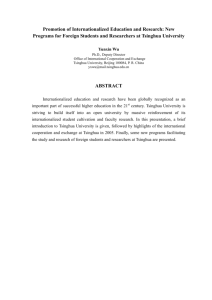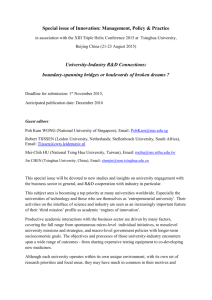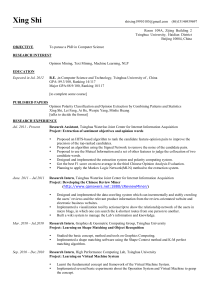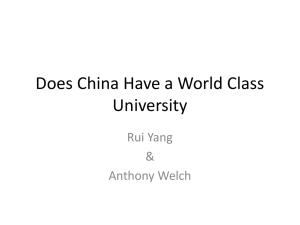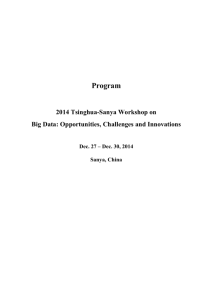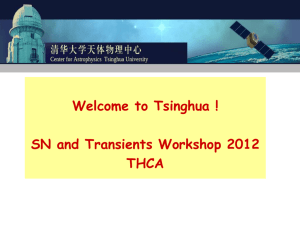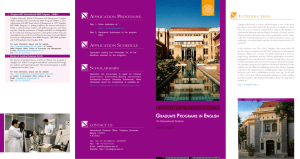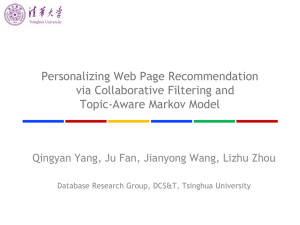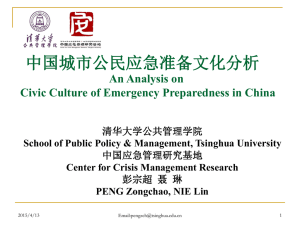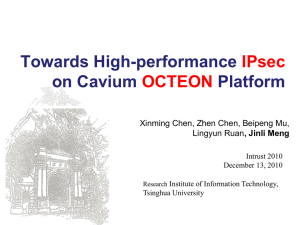Document 5267837
advertisement
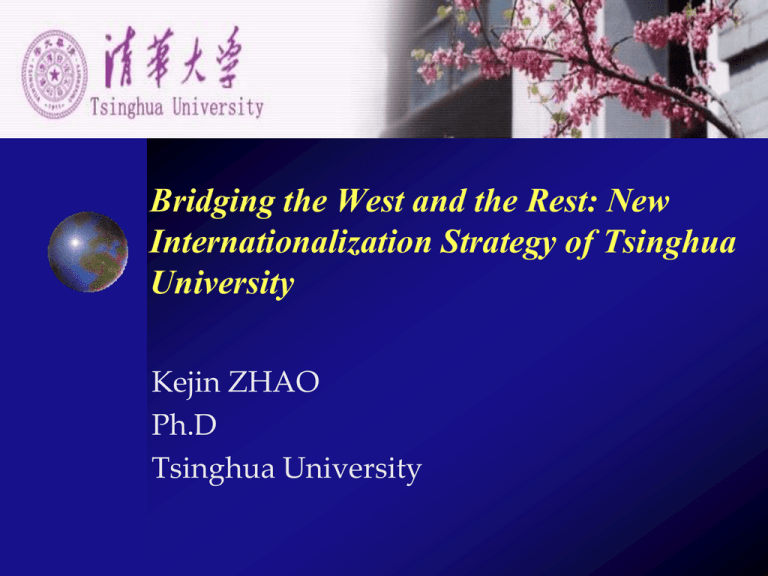
Bridging the West and the Rest: New Internationalization Strategy of Tsinghua University Kejin ZHAO Ph.D Tsinghua University Content Introduction MIR: Master Program in IR Ph.D program in Developing Countries Schwarzman Scholars program Dual Master Degree program with SAIS Joint Center of Global Policy with Carnegie Future Plan Introduction Tsinghua University is a research university located in Beijing, China, and one of the nine members in the C9 League. It has been consistently regarded by both domestic and international university rankings as, alongside Peking University, the top higher learning institution in mainland China. From the beginning, Tsinghua is an internationalized preparatory school for students sent by the government to study in the United States. From 1905 to 1925, The faculty members were recruited from the United States and its graduates transferred directly to American schools as juniors upon graduation. In 1952, the Chinese government regrouped the country's higher education institutions in an attempt to build a Soviet style system, with individual institutions tending to specialize in a certain field of study. Since the 1980s, the open-up policy has marked the beginning of re-internationalization of Tsinghua. and cultural exchange among students and scholars became vital component of the University. In the middle of 1990s, former president of Tsinghua, Professor Wang Dazhong, put forward a new vision of Tsinghua aimed at establishing a comprehensive, research oriented and open university. The open university means openness to the society and international community. So, Tsinghua has built friendly relationship with more than 200 universities from more than 60 counties and regions. Lots of joint research and dual degree programs have been initiated such as Tsinghua-Brookings Center, Tsinghua-Carnegie Center and Double Master degree with SAIS from 2015. From 2013, the new president, Mr. Chen Jining, is promoting new internationalization strategy of which highlight bridge the west universities and universities in emerging economies and developing countries. So, more and more new program has been initiated. MIR: Master Program in IR Announced in 2011, The program aims to provide international students with solid training on fundamental international theories and modern methods, deepen their understanding on Chinese classic and modern thoughts on international relations and enhance their capabilities to apply the basic international theories and Chinese approaches to the analysis of the international issues and foreign affairs. The program is designed to be completed in two years of fulltime study, including completion of the course curriculum and the Master thesis. Each year, we give 35 offers to the applicants. Now, there are more than 100 graduated students from more than 40 countries. Ph.D program in Developing Countries Announced in 2012, Tsinghua initiated Ph. D program in developing country studies. The program open to Chinese undergraduate students and post graduate students who have strong mission to study developing countries in coming decades. The program is 4-6 years program. The students who get offer will finish the main courses at Tsinghua in the first year. Then, they will be sent to studies at west universities for another year. During their stay at west universities, they can establish strong academic communities on specific developing country studies. With strong academic background, they are required to conduct field works as exchange students in developing country for Ph.D dissertation drafting. At last, they will attend the defense in Tsinghua University and win the diploma from Tsinghua. Now, there are 24 students studied at Tsinghua and abroad in the program. Schwarzman Scholars program Schwarzman Scholars, founded by American financier Stephen A. Schwarzman, founder of asset management firm, Blackstone Group, is an international scholarship program announced on April 2013, designed to "educate the next generation of global leaders". The program is intended to launch in June 2015, upon completion of Schwarzman College at Tsinghua University. The Schwarzman Scholars program will consist of 200 scholars to be chosen annually to work towards a one-year Master’s Degree in Public Policy, International Relations, Engineering, Economics & Business. These scholars will live on the university campus at Schwarzman College, a residential college being built specifically for this program. 45% of the participants will come from the U.S., 20% from China and 35% from the rest of the world. Advisory board Nicolas Sarkozy, Former President of the French Anthony “Tony” Blair, Former Prime Minister of Great Britain and Northern Ireland Brian Mulroney, Former Prime Minister of Canada Kevin Rudd, Former Prime Minister of Australia Henry Kissinger, 56th United States Secretary of State Colin Powell, 65th United States Secretary of State Henry “Hank” Paulson, 74th United States Secretary of the Treasury John L. Thornton, Chairman of the Brookings Institute Sir James “Jim” Wolfensohn, 9th President of the World Bank Group Robert “Bob” Rubin, 70th United States Secretary of the Treasury, Co-Chairman of the Council on Foreign Relations Condoleezza Rice, 66th United States Secretary of State Advisory board Richard “Rick” Levin, former President of Yale University Richard Haass, President, Council on Foreign Relations Richard Brodhead, President, Duke University Yo-Yo Ma, the American cellist (Honorary) Iain Conn, Chief Executive, Refining and Marketing, British Petroleum Chen Ning Yang, Albert Einstein Professor Emeritus, Nobel Laureate in Physics Tung Chee Hwa"CH Tung," Former Chief Executive and President of the Executive Council of Hong Kong and current Vice Chairman of the National Committee of the Chinese People's Politics Consultative Conferenc Dual Master Degree program with SAIS The Tsinghua University – Paul H. Nitze School of Advanced International Studies (SAIS), Johns Hopkins University Dual Degree Master’s Program is the first dual degree master’s program focused on global politics and economics run cooperatively by Chinese and U.S. institutions of higher education. As an opportunity for students to develop a sophisticated understanding of international affairs and law, the curriculum emphasizes interdisciplinary breadth, a solid foundation in economics, and rigorous understanding of key world regions. After graduation, students will be familiar with Sino-U.S. political and economic systems, gain in-depth knowledge of various parts of the world, and grasp advanced analytical techniques. They will be prepared to actively participate in global governance, while at the same time contributing significantly towards China’s development. Joint Center of Global Policy with Carnegie The Carnegie–Tsinghua Center, a joint center set up by Tsinghua University and the Carnegie Endowment for International Peace, brings together the world’s top scholars and experts from China, the United States, and the international community for collaborative research with an aim toward identifying effective and constructive solutions to common global challenges and issues of today. The Carnegie–Tsinghua Center for Global Policy draws on the successful experience of Carnegie’s Moscow Center, established in 1994, and follows the launch of its operations in Beirut and Brussels. The Carnegie–Tsinghua Center is also part of Carnegie’s well-established Asia Program, which provides clear and precise analysis to policy makers on the complex economic, security, and political developments in the AsiaPacific region. An Advisory Council composed of distinguished leaders from the policy, business, and academic communities in China provides the Carnegie– Tsinghua Center with advice and support. Future Plan Summer school with SAIS in 2015; BRICS University League Partnership with other universities; Research Network in BRICS Studies; Exchange program of students and scholars. MOOCs on global politics and economy(10 open courses) Thanks for your attentions December 6, 2014
